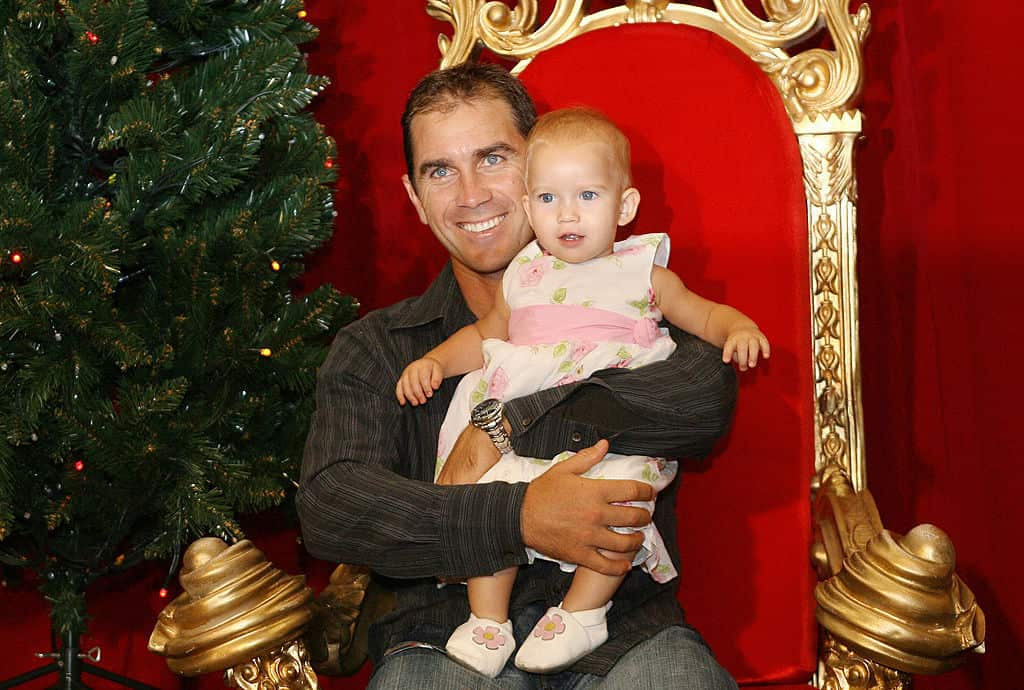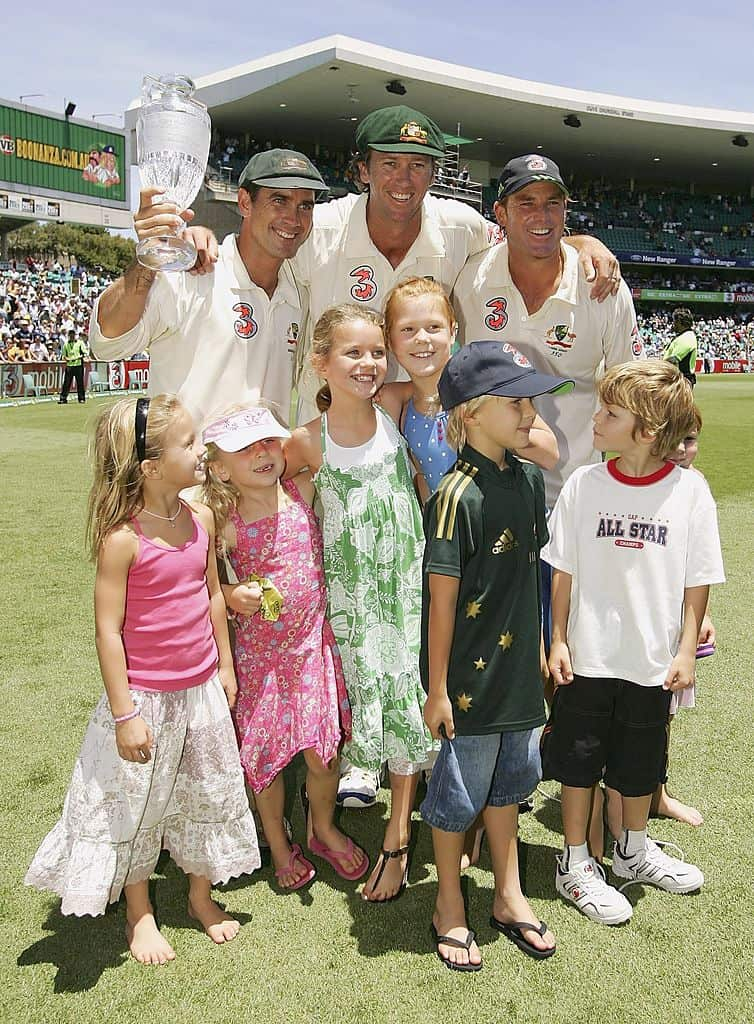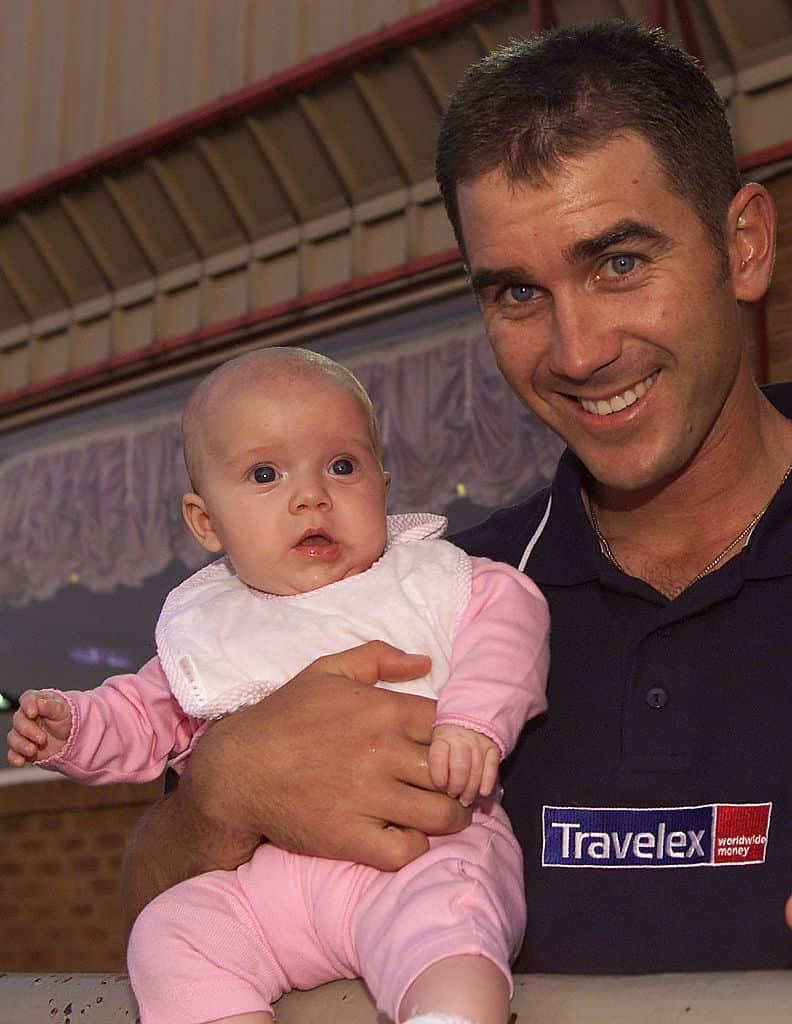Preview above: Insight hears from a diverse group of dads about the trials and tribulations of modern-day parenting.Full ep. on SBS On Demand
“One of the most powerful things I’ve learned about fatherhood is that how I treat my wife is the most important gift I can give my daughters. If I treat her with love and respect and care, that’s how they should expect to be treated by other men.”
Justin Langer, Australia’s cricket coach, and one of the game’s most successful opening batsmen, is a dad to four daughters - all under 25 years old.
Despite playing through the glory years of Australian cricket, and now leading the national team through one of its most arduous eras – it was leaving his newborn daughter, and then failing at the crease, that nearly resulted in him being the first Australian to retire during an Ashes Test.
“The great captain and friend of mine, Steve Waugh, used to say when things are going really well, don’t get too high, when things are going really badly, don’t get too low – try and keep it as level as possible,” Langer said.
“That’s important because if you’re in a leadership role, and as a parent you are, then you’ve got to stay calm. As calm as you can.”
Beginning a career and becoming a dad
In his professional life coaching elite athletes, Langer spends hours explaining the importance of commitment, teamwork and perseverance – traits he shares with wife Sue, his best friend and partner since the age of 14.

Growing up entangled in each other’s lives, cricket became a fundamental driver in what would become a young Langer's future career. But great sacrifice in their personal lives loomed large on the pair’s horizon.
As a teenager, Langer would head interstate or overseas to play for periods of six months at a time, he played club cricket in England, and spent a year at the Adelaide cricket academy – a long way from his West Australian home, his family and Sue.
“The fortunate thing is that she’s grown up with it, she knew going in that I was a cricket player and that I always wanted to play cricket.”
The pair married in 1996 and soon after welcomed their first daughter.
“The first moment I saw my baby it was like she put a little hand into my chest and grabbed my heart – that was it, it was unconditional love and it still is to this day.”
At just 26 years old, and a new dad to a one-month old baby, Langer made the impossible choice of embarking on the 1997 Ashes Tour - leaving Sue and Jessica behind.
“I’ll never forget it. My dad picked me up early to take me to the airport… he goes, ‘Have you got a cold or something son?’ And I told him I’d been bawling my eyes out all the way there because I was leaving this little angel, this little princess, and I wasn’t going to see her for four months.”
Despite the heartache, Langer would take home something valuable, advice from a man considered the most successful Test captain in cricket history – Steve Waugh.
“Steve said, ‘If I’m going to sacrifice being with my kids and my family and my home, I’m going to put all my focus into being the best batsman in the world because If I’m not going to be the best player in the world, why would I sacrifice being away from my family?'.”
That influential advice propelled Langer through a 14-year Test career, and into fatherhood.

Work, life balance
But when Langer wasn’t playing well, things started to crumble.
“I found it really hard to be away from my family when I wasn’t performing, because you get the double-whammy: not only are you not performing in your job and you start feeling sorry for yourself, then you start missing your kids more.“
“That’s when you do feel like you’ve got depression.”
In 2019, Langer spent 300 days on the road, away from home and away from his wife and kids.
As a dad he missed a lot of special milestones in his children’s lives. It got him wondering how that might affect them in the future – and for Langer, that felt like losing.
“Losing is great in a sense, because when you win, you realise how great it feels. So I lost a lot, and my kids lost a lot, but the upside is when I’m home and taking them for a ride on the bike, or taking them to their first day of school or being there for their graduation – it feels even better.”
“The reality is, to have the sweet taste of good times, you have to respect the shit times as well.”
And in a twist of fate, it was being a father that saved his playing career.
After not playing a test in 1997, Langer was heading into the 2001 Ashes series in possibly the worst form of his playing career. Two weeks before jetting to England he was dropped from the squad at 31 years old – there was every chance he’d never play again.
“I was the worst batsman in the world, and I was still on the Australian team.”
In a practice match just prior to the Fourth Test of the series Justin recalls going out for a duck in the second innings.
“I was trying so flipping hard, and I got this duck. I was walking off the ground to the cove near Brighton and I just wanted the whole world to open up and swallow me alive. I honestly felt that low.”
Langer called home, his parents, his best mate, then Sue and the girls. He said his career was done. It was his family who reminded him that he’d be the first Australian ever to retire in the middle of an Ashes, but still Langer insisted he was done.
Sue packed up her things and flew two-month old Sophie, their youngest daughter at the time, to England to support Langer in what might have been his final test. But, an injury to Steve Waugh would open up one vacancy in the squad and it was Steve who would inform Langer that he’d be opening the batting in the final test.
“So I went on to get 100 in the first test, and opened the batting for the next five years. So I was that close to quitting, that close, but if you just hang in there, even when things feel so bad, it’s amazing what’s around the corner.”
“Because Sue flew over with Sophie, that was the turning point, even if I never played cricket again I’ve got this beautiful family, so I don’t even have to worry about it. Classic.”

Finding balance
Now two years into his tenure as Australia’s cricket coach, his cool rationality approaching fatherhood helped reset a broken team.
Langer says he sees the players as he sees his kids, understanding both must experience failures to learn and develop, so he can guide and help them to grow.
“One thing that helps me be a good coach is that I’m a dad, what I’ve learnt is that I’ve got four daughters, they’re all so different even though they came from the same place.”
So all my players are going to be so different, and you have to treat them all differently… in any leadership position, you have to build relationships - with your kids and with your players, in a lot of ways being a dad has helped me to be a better coach and as a coach now it’s helped me to be a better dad as well.
“I may be a tough guy as a coach, but I’ve often said, I’ll judge my coaching career by how many wedding and christening invitations I get. It means that I’ve had an impact on their life, not just on their cricket career.”
Now as the international sporting world grinds to a halt, and Australia’s national cricket team is months past their last match, Justin has time to enjoy the special, individual activities he and his daughter’s love.
“Every Sunday I go to the Fremantle Markets with my hippie daughter, Ali-Rose, we drink our coffee, she has a vegan gozleme and I have my gozleme and we talk shit and it’s just awesome, we’ve done if for five or six years – it’s one of my favourite things I do every time I’m home.”
“My third daughter Sophie loves baking, she’s a brilliant cook, so our special thing is that she bakes for me.
“With Grace, my little one, it’s her netball, love taking her to netball, or picking her up from school. That’s our time to listen to music and talk. It’s unreal.
“My oldest daughter Jess, she’s lived in London for three years, we catch up and go out to dinner, and we stay connected through little emojis, that’s our little thing.”
On the pitch and at home, it’s the individual care that Justin puts into his players and his family that make the wins that little bit more exceptional.
“Number one, you’ve got to give them love, care for them and make them feel special – no matter what.”
Insight is Australia's leading forum for debate and powerful first-person stories offering a unique perspective on the way we live. Read more about Insight
Have a story or comment? Contact Us


